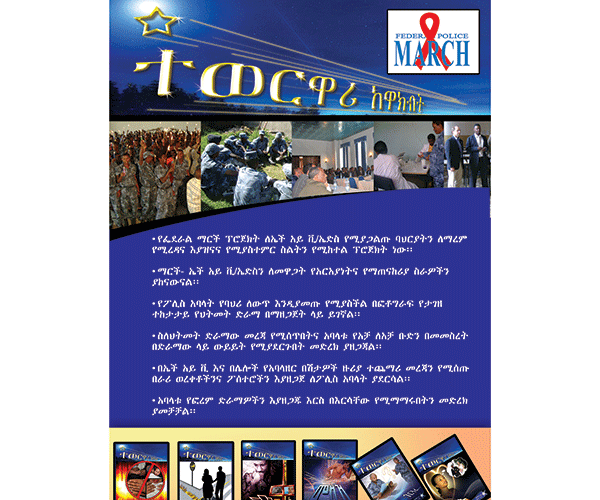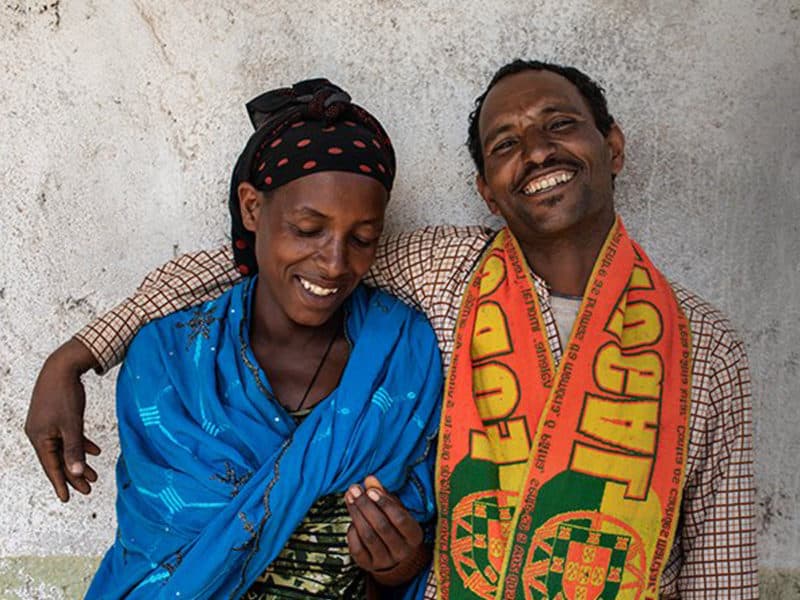The Federal Police released the first two editions of Tewerwari Kewakebt or ‘The Shooting Stars’, a new serial comic book addressing HIV and AIDS today. Designed to reduce the risk of HIV infection among members of Ethiopia’s police force, the comic series will be distributed to officers within the Federal Police for use during regular peer group discussions.
Although comic books are generally a novelty in Ethiopia, certain audiences have caught on to the entertainment format. It was first introduced to the public through the story of the fictional Black Tigers Ethiopian military camp, which was launched by the National Defense Forces of Ethiopia in late 2006 and is currently enjoying wide acclaim.
The Ethiopian Police Force is known for its swift and efficient response in case of crisis. The main characters of this comic serial, who are also members of the police force, are seen using their crisis handling skills in fighting and overcoming the threat of HIV and AIDS. Like the stars in the dark night, they shine light on the path to follow and provide guidance for their peers, thus the title, The Shooting Stars.
Combining humor, action and gripping drama, the 52 edition comic book will enable officers within Ethiopia’s Federal Police to better understand the risks they face from HIV and develop strategies that will keep them safer.
“The Print Serial Drama is an innovative and a welcomed contribution to our efforts to tackle the AIDS pandemic in the police force. We hope that these Print Serial Dramas will trigger discussions and help our officers make informed decisions about their lives, and protect themselves and their families from HIV and AIDS,” said Dr.Mikael Amdemariam, FP MARCH Project Director.
The Shooting Stars uses the Modeling and Reinforcement to Combat HIV/AIDS (MARCH) model for HIV prevention. MARCH promotes behaviors that reduce the risk of HIV infection, such as faithfulness, condom use and early detection and treatment of sexually transmitted infections (STIs) to name a few, by using role models to demonstrate positive behavior change through serial dramas and entertainment education. The project also includes reinforcement activities to create an environment in which these positive behaviors are discussed and reinforced in a peer group setting.
“The MARCH Project using the PSDs (Print Serial Dramas or Comic Books) is an innovative way of conveying the ABC (abstinence, be faithful, use condoms) HIV preventive messages through entertainment education and peer-to-peer learning to bring about behavior change among the police force and their families. This approach as well encourages behavior change in the form of increased use of counseling and testing, prevention of mother-to-child transmission, antiretroviral treatment and other services,” said Dr. Tadesse Wuhib, Country Director of CDC-Ethiopia.
Tewerwari Kewakebt (The Shooting Stars) follows the lives of four characters:
Inspector Kinfe; a loving husband and father of two, Kinfe is a dedicated worker, respected officer and good friend. Alas, this seemingly perfect man has one flaw: he considers occasional cheating his right as a man. Circumstances will, however, prove him wrong and convince him that faithfulness is the higher path to follow.
Chief Sergeant Ali; a 29-year-old heartthrob who owes his luck with the ladies to his upbringing. An only child, he grew up showered with the love of his single mother and all the other women in his community. His happy-go-lucky, adventurous nature effortlessly leads him into the open arms of willing women – and trouble. We will witness his struggle to change his way of life and become a role model for positive living.
Constable Tigist: a pretty, feisty 23-year-old who, despite her mother’s pleas, joined the force. Tigist idolizes her late father, a policeman who was killed while on duty. Able, outspoken and a go-getter, it is her destiny to excel in the force. Always one of the guys, she’s convinced that she knows them well enough never to fall for their smooth talk. Unfortunately, life has other plans for her. Her story shows us how one mistake tests her courage to the limits as she battles to forge a healthy family life.
Constable Yonas; a handsome 19-year-old recruit, excels in the training field and lives by the motto, “why buy a book when one can join the library?” He’s a bit of a player when it comes to women. Over the next year, we see how life’s lessons change his attitudes to relationships in general, and STIs and condom use in particular.
The Shooting Stars is a product of a partnership between the Ethiopian Federal Police (FP) and the U.S. Centers for Disease Control and Prevention (CDC) – Ethiopia with technical assistance from the Johns Hopkins Bloomberg School of Public Health/Center for Communication Programs (CCP) – AIDS Resource Center (ARC). It is funded by the President’s Emergency Plan for AIDS Relief (PEPFAR) through CDC.
“We have tried to make the characters as true to life as possible and we certainly witnessed some heated discussions about lifestyles and HIV after the group had read the comic book,” says Sofnias Nega, CCP Program Officer. “That is exactly the response we are looking for since only by discussing these things with their peers will officers be able to decide for themselves how best they can be protected from HIV.”
With continued assistance from CDC and CCP, a similar comic book will be developed for the students at Addis Ababa University, one of the largest universities in Ethiopia.
Notes for Editors
Since opening in 2001, the AIDS Resource Center (ARC) has been providing an extensive range of information services on HIV and AIDS, STIs, and tuberculosis (TB). The ARC serves as a hub for a host of resources and services, such as a comprehensive multimedia library collection, high-speed Internet access for HIV and AIDS research, an HIV/AIDS website with searchable databases, and a materials clearinghouse. The center also runs the Wegen 952 national HIV and AIDS talkline and produces high-quality and culturally appropriate behavior change communication (BCC) materials on various health topics. www.etharc.org.
The President’s Emergency Plan for AIDS Relief (PEPFAR) is a five-year, $15-billion U.S. government initiative to combat the global HIV/AIDS pandemic with the goals of treating two million HIV-infected people, preventing seven million new infections, and care for 10 million HIV-infected individuals and AIDS orphans. It is the largest commitment ever made by a nation for an international health initiative dedicated to a single disease. A significant amount of these resources focus on 15 of the most afflicted countries in sub-Saharan Africa, Asia, and the Caribbean. Ethiopia is one of the 15 focus countries to receive support from PEPFAR. Since 2001, CDC-Ethiopia has been supporting the Ethiopian government to reduce the incidence of HIV/AIDS, STI and TB and mitigate their impact through prevention, care, support, treatment and capacity building activities.





